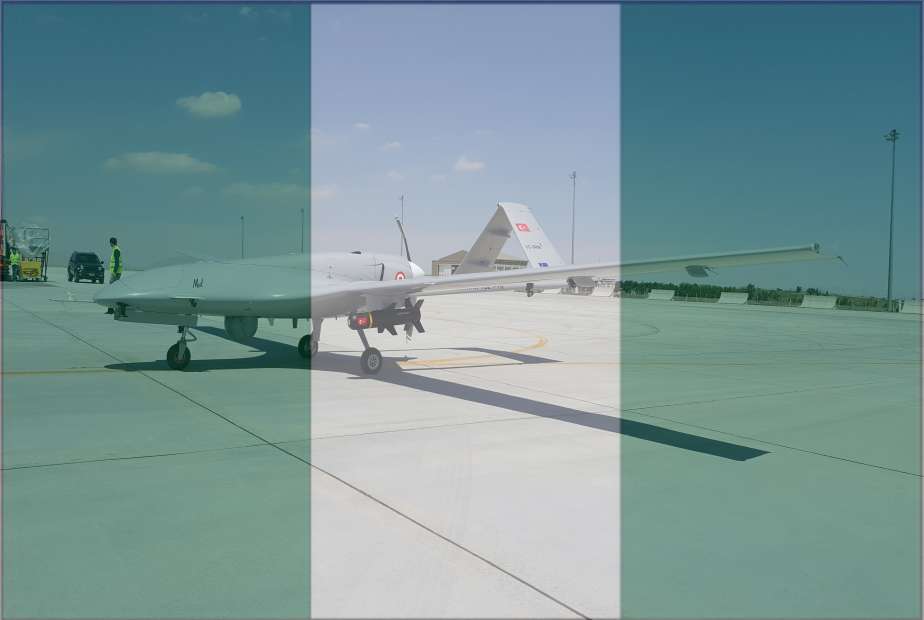Breaking news
Nigeria to acquire Turkish Bayraktar TB2 Unmanned Aerial Vehicles.
On August 20, 2023, the Twitter account DefenseNigeria released photos showcasing a complete Bayraktar TB2 system, announcing its delivery scheduled for October. This confirmation aligns with Military Africa's report from September 2022.
Follow Air Recognition on Google News at this link
 On August 20, 2023, the Twitter account DefenseNigeria released photos showcasing a complete Bayraktar TB2 system, announcing its delivery scheduled for October. (Picture source: Wikimedia )
On August 20, 2023, the Twitter account DefenseNigeria released photos showcasing a complete Bayraktar TB2 system, announcing its delivery scheduled for October. (Picture source: Wikimedia )
In January 2021, Nigeria and Turkey initiated defense collaboration talks focusing on counter-terrorism support and the acquisition of various military hardware, potentially including attack helicopters, armed drones, and other infantry systems.
In October 2021, Governor Bello Matawalle of Zamfara State announced the acquisition of armed drones from a Turkish company to combat terrorism after a meeting with the Turkish-Nigerian Business Congress and other Nigerian Governors.
By September 2022, Nigeria had reportedly ordered the Turkish Bayraktar TB2 system. Nigerian Senator Ali Ndume, Chairman of the Senate Committee on Army, stated that Nigerian UAV pilots were undergoing training in Turkey.
The photos released by @DefenseNigeria actually feature a Bayraktar TB2 system, which includes two mobile Ground Control Stations and six Bayraktar TB2 Unmanned Combat Aerial Vehicles (UCAVs). Each system comprises six Bayraktar TB2 drones, two Ground Control Stations (GCS), three Ground Data Terminals (GDT), two Remote Video Terminals (RVT), and a Ground Support Unit (GSU) for battery recharging and maintenance. The system's redundant control architecture allows the pilot, payload operator, and mission commander to command, control, and monitor the aircraft.
This acquisition will make Nigeria and Niger the largest operators of Turkish-made Bayraktar UCAVs in the region, with both countries operating six units each.
The Bayraktar TB2 is a medium-altitude, long-endurance (MALE) UCAV developed by Baykar, Turkey's leading defense technology company. Since its inaugural flight in 2014, it has gained significant attention, especially during the early stages of the conflict in Ukraine. The drone costs between $1 million and $2 million per unit, making it an affordable option compared to the nearly $20 million per drone for a Protector drone manufactured by General Atomics.
With a wingspan of 12 meters and a length of 6.5 meters, the Bayraktar TB2 is compact yet highly capable. It can remain airborne for up to 27 hours, making it ideal for extended surveillance and reconnaissance missions. The UCAV offers various payload options, including electro-optical and infrared sensors, laser-guided missiles, and precision-guided munitions. It can reach speeds of up to 222 km/h and operates at altitudes ranging from 200 to 27,000 feet, with a maximum communication range of 150 kilometers.
Nigeria's aerial capabilities have seen significant expansion, with a diverse fleet of helicopters, aircraft and drones from various countries. Recent acquisitions include Pakistan's JF-17 Thunder fighter jets, Italy's armed AW109M light helicopters, Russia's Mi-35M attack helicopters, and China's unmanned aerial vehicles. With the upcoming addition of the US and Turkish attack helicopters, Nigeria's helicopter fleet continues to expand.
In October 2020, the Nigerian army also acquired 14 other chinese UAVs, including two Wing Loong II, four CH-4B, and two CH-3B drones. Within the Economic Community of West African States (ECOWAS), Nigeria is recognized for having the best- equipped army to intervene in Niger. With a well-developed defense infrastructure and significant experience in regional military operations, Nigeria's armed forces are an influential presence in the region. The acquisition of the Türkiye Bayraktar TB2 System further solidifies Nigeria's military capabilities and its role in maintaining regional security.


























